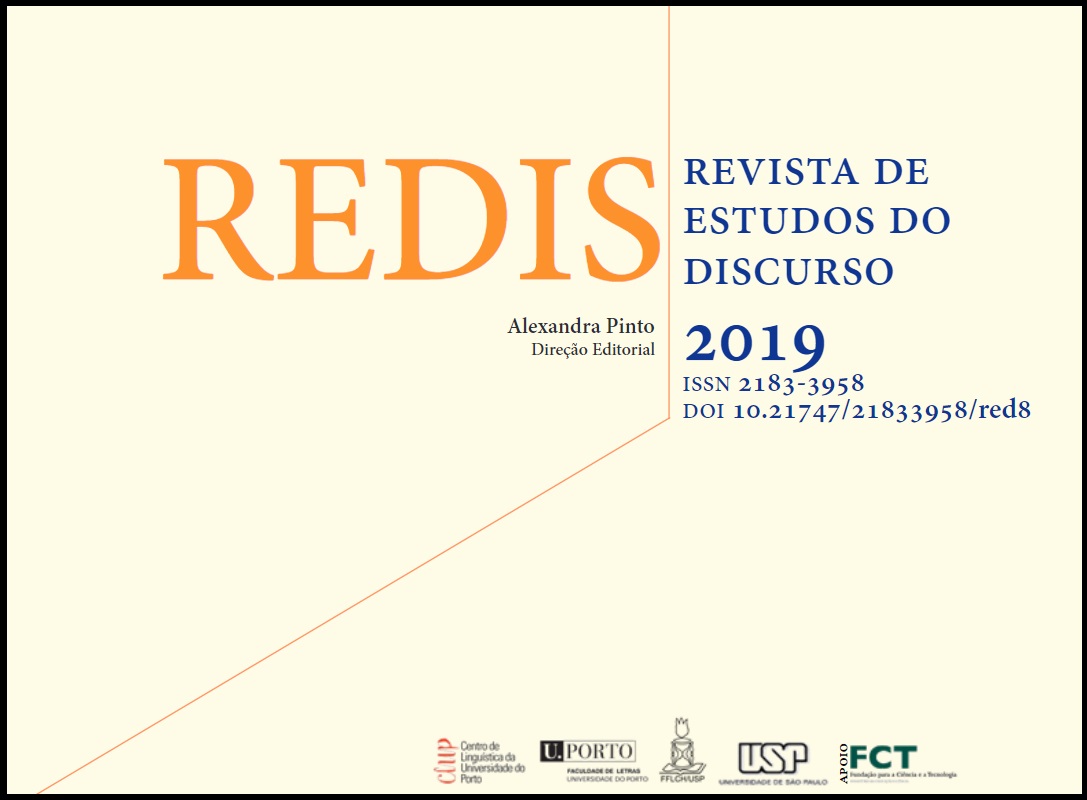Argumentação ad hominem, formas de tratamento e protesto político
DOI:
https://doi.org/10.21747/21833958/red8a5Palavras-chave:
Descortesia, Argumentação Ad Hominem, Formas de tratamento, Manifestações políticas, Redes sociaisResumo
A descortesia linguística é um fenómeno discursivo que deve ser analisado no contexto e no género discursivo em que surge. Decorre da inadequação do ato de fala do locutor, tendo em conta normas sociodiscursivas. Mas faz parte do protesto político, sendo socialmente tolerada nesse contexto. Pretende-se analisar a construção discursiva da descortesia no espaço público em Portugal, tendo em conta os protestos em manifestações políticas e nas redes sociais; relacionar a descortesia com os traços dos géneros discursivos em causa; identificar argumentos ad hominem com base nas formas de tratamento.O corpus é constituído por enunciados descorteses produzidos no espaço público, em cartazes e palavras de ordem de manifestações ou nas redes sociais.
Referências
Amossy, R. (2009). Argumentation in Discourse: A Socio-discursive approach to arguments. OSSA Conference Archive. 1. https://scholar.uwindsor.ca/ossaarchive/OSSA8/keynotes/1 (acesso: 15 julho 2019).
Amossy, R. (2000). L’Argumentation dans le discours. Paris: A. Colin.
Amossy, R. (1999). The argument ad hominem in an interactional perspective. Proceedings of the Forth International Conference on Argumentation. Amsterdam: Sic Sat, pp. 14-18.
Ayala, S. (2001). FTAs and Erskine May: conflicting needs? - Politeness in Question Time. Journal of Pragmatics 33, 143-169.
Bousfield, D. (2008). Impoliteness in Interaction. Amsterdam: John Benjamins.
Bousfield, D. & Locher, M. (eds) (2008). Impoliteness in Language. Berlin: Mouton de Gruyter.
Briz Gomes, A. (2004). Cortesía verbal codificada y cortesía verbal interpretada. In Bravo, D. & Briz Gomes A. (eds), Pragmática sociocultural: estudios sobre el discurso de cortesia en espanol. Barcelona: Ariel.
Brown, P. &. Levinson, S. C (1978/1987). Politeness: Some Universals in Language Usage. Cambridge: University Press.
Carvalheiro, Prior & Morais (2013). Público, privado e representação online: o caso do Facebook. In Fidalgo, A., & Canavilhas, J. (eds.). Comunicação Digital - 10 anos de Investigação, pp. 101-119. Coimbra: Minerva.
Culpeper, J. (2011) Using language to cause offence. London: CUP.
Culpeper, J. (2009). Impoliteness: Using language to cause offence. Full research report ESRC End of Award Report, RES-063-27-0015. Swindon: ESRC.
Culpeper, J. (2005). Impoliteness and entertainementin television quiz show: the weakest link. Journal of Politeness Research 1, pp. 35-72.
Culpeper, J. (1996). Towards an anatomy of impoliteness. Journal of Pragmatics 25, pp. 349-367.
Djian, P. (2008). Des visées de l’injure. In Desmons, É. & Paveau, M.-A. (eds), Outrages, insultes, blasphèmes et injures: violences du langage et polices du discours. (pp. 177-188). Paris: L’Harmattan.
Ernotte, P. & Rosier, L. (2001). Le lexique clandestin. Louvain-La-Neuve: Duculot.
Fracchiolla, B. & Moise, C. (2009). «Construction de la violence verbale et circulation des discours autour du Contrat Première Embauche ». In Lopez-Munoz, J.-M., Marnette, S., Rosier, L., Vincent, D. (eds). La circulation des discours, pp. 103-126. Canada: Nota Bene.
Fuentes Rodríguez, C. (2012). Subjetividad, argumentación y (des)cortesía. Círculo de Lingüística Aplicada a la Comunicación 49, pp. 49-92. http://www.ucm.es/info/circulo/no49/fabregas.pdf (acesso: 15 julho 2019)
Harris, S. (2000). Politically Impolite: Extending politeness theory to adversarial political discour-se. Discourse and society 12 (4), pp. 451-472.
Ilie, C. (2001). Unparliamentary Language: insults as congnitive formas of ideological confronta-tion. In R. Dirven, F. Roslyn & C. Ilie (Orgs). Language and Ideology, vol.II, pp. 238-261. Amsterdam: John Benjamins publishing.
Kerbrat-Orecchioni, C. (2012). L’impolitesse en interaction: Aperçus théoriques et étude de cas. Lexis special 2. Lyon: ICAR.
Locher, M. & Bousfield, D. (2008). Introduction: Impoliteness and power in language. In Bousfield, D. & Locher, M. (eds.), Impoliteness in Language. Studies on its Interplay with Power in Theory and Practice, pp. 1-13. Berlin/New York: Mouton de Gruyter.
Locher, M. & Watts, R. (2008). Relational work and impoliteness: Negotiating norms and linguistic behaviour. In Bousfield, D. & Locher, M. (eds.), Impoliteness in Language. Studies on its Interplay with Power in Theory and Practice, pp.77-99. Berlin/New York: Mouton de Gruyter.
Marlangeon, S. (2014). Delimitación de unidades extralinguisticas de análisis del discurso de (des) cortesia. Signo y Sena 26, pp. 7-22.
Marques, M. A. (2015). Todos os rios vão dar a Março. O movimento dos indignados e a construção de um ethos coletivo. I Congresso Internacional de Estudos do Discurso (I CIED), Faculdade de Filosofia, Letras e Ciências Humanas, Universidade de S. Paulo, Brasil.
Orkibi, E. (2012). L’insulte comme argument et outil de cadrage dans le mouvement «anti-Sarko». Argumentation et analyse du discours 8. http://aad.revues.org/1335 (acesso: 7 junho 2014)
Perelman, Ch & Olbrechts-Tyteca, L. (1970/1958). Traité de l’argumentation. La nouvelle rhétorique. Presses de L’université Libre de Bruxelles.
Plantin, Ch. (2005). L’argumentation. Paris: Presses Universitaires de France.
Plantin, Ch. (1996). Le trilogue argumentatif. Présentation de modèle, analyse de cas, Langue Française, 112, pp. 9-30
Van Eemeren, F. & Grootendorst, R. (1984). Speech acts in argumentative discussions. A theoretical model for the analysis of discussions directed towards solving conflicts of opinion. Berlin/Dordrecht: De Gruyter/Foris.
Downloads
Publicado
Como Citar
Edição
Secção
Licença
Direitos de Autor (c) 2020 Redis: Revista de Estudos do discurso

Este trabalho encontra-se publicado com a Licença Internacional Creative Commons Atribuição 4.0.
Os autores cedem à REDIS: Revista de Estudos do Discurso, o direito exclusivo de publicação dos seus textos, sob qualquer meio, incluindo a sua reprodução e venda em suporte papel ou digital, bem como a sua disponibilização em regime de livre acesso em bases de dados.




